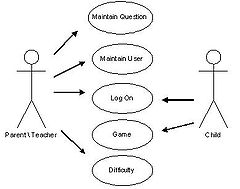
Actor (UML)
Encyclopedia

Unified Modeling Language
Unified Modeling Language is a standardized general-purpose modeling language in the field of object-oriented software engineering. The standard is managed, and was created, by the Object Management Group...
(UML) "specifies a role played by a user or any other system that interacts with the subject."
"An Actor models a type of role played by an entity that interacts with the subject (e.g., by exchanging signals and data),
but which is external to the subject."
"Actors may represent roles played by human users, external hardware, or other subjects. Note that an actor does not necessarily represent a specific physical entity but merely a particular facet (i.e., “role”) of some entity
that is relevant to the specification of its associated use cases. Thus, a single physical instance may play the role of
several different actors and, conversely, a given actor may be played by multiple different instances."
UML 2 does not permit associations between Actors. Yet, this constraint is often violated in practice since the generalization/specialization relationship between actors is useful in modeling overlapping behaviours between actors.

